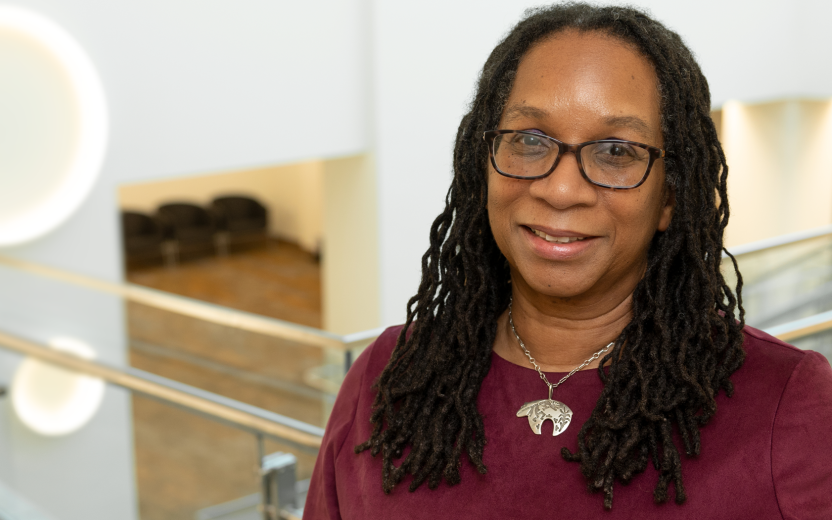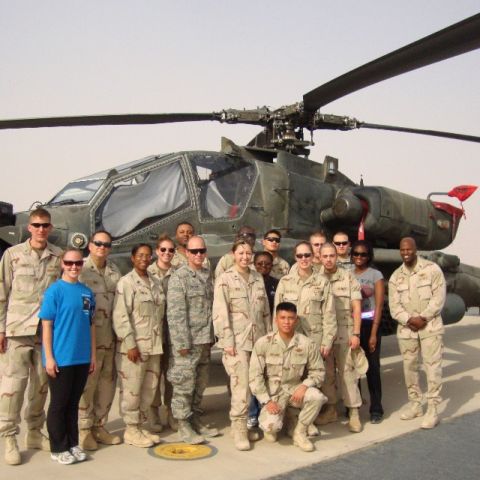Staff Stories: Jada Hamilton

Serving the seas to scholars
by Grace DePaull
After two decades of exceptional service to her country, Dr. Jada Hamilton embarked on a new journey – one that took her from the high seas to the heart of academia. Today, she finds herself at Cornell Health, where her mission has shifted from caring for the brave men and women in uniform to nurturing the health and wellbeing of college students.
Hamilton is the director of medical services and interim chief of clinical operations and services at Cornell Health. She first arrived at the university in August 2013 after serving over twenty years in the U.S. Navy as a physician.
“What was appealing about Cornell Health at the time was that it prioritized patient-centered care, which aligned with my background in the military. Both experiences had a similar focus with a goal of how to care for people in the best and most cost-effective way,” Hamilton said.
While in the Navy, Hamilton served as a medical officer and was stationed in Bethesda, MD; Iwakuni, Japan; Okinawa, Japan; Chinhae, Korea and Jacksonville, FL and deployed to Djibouti, Africa and Kuwait.
Not only was Hamilton caring for the health and wellbeing of active-duty members and their loved ones, but she was simultaneously raising a family of her own. Her children and husband followed her wherever she was stationed, and three of her four children were born in Japan. However, the desire for more stability sparked her retirement in 2012.
“My kids were getting older,” Hamilton said. “When they were toddlers, it was easier to move locations and switch schools. And so, I knew it was time to be in one stable place.”
After her retirement, Hamilton had no intentions of pursuing a career in higher education and always envisioned working for a VA or military clinic. But when the opportunity emerged for her to join Cornell Health as a clinician, Hamilton took the chance and found that caring for students wasn’t far from her duties in the Navy.
“I thought it would be a great experience working on a college campus with young adults and help give them the tools to continue on with healthy lives after graduation,” Hamilton said. “This was similar to what we did for our active-duty members. Most people were on the base for three to four years and then transitioned off; the same goes for college students on campus.”
There is a level of readiness and preparation that is required to navigate the challenges and stresses of being a college student and an active-duty member. Whether going into battle or preparing for an exam, health is often a determinant of how successful one can be.
“To bring your best self to work, classes, clubs or committees, your health lies at the center,” Hamilton said. “Students are often young adults who are navigating health care for the first time on their own. And so, my role is to best support them and help them realize that prioritizing their health is going to be key in their success on campus and in life.”
While there are many similarities between the two populations, when Hamilton arrived at Cornell, she was shocked at the challenges that students face when it comes to accessibility and affordability of healthcare.
“When I was in the military, I was shielded from many of the issues and inequalities that exist,” Hamilton said. “On the military base, everyone was insured and had access to the health clinic and medications at no cost. But when I got to Cornell, I recognized that there are many students who can’t afford the care that we provide. Some experience ridiculous co-pays and extra out of pocket costs for prescriptions. Some students are experiencing food insecurity. Can you imagine asking a student to make sure they get enough food and the right nutrients to fuel themself, but they don’t know where their next meal is coming from?”
While it was eye-opening to witness these inequalities, since her arrival, Hamilton has made it a priority to address these concerns, not only at Cornell but in the surrounding community.
Hamilton was able to resurrect a diversity working group to address diversity-related concerns within college campuses and college health settings. She is also a member of FIRM (Fighting Institutional Racism in Medicine), which was formed by local physicians, nurses and individuals in the public health sector in Ithaca and Tompkins County to improve health equity and eliminate racism in medicine.
With the goal of getting more involved in the needs and concerns of the community, Hamilton is an advocate for underserved and underrepresented populations.
“It can be very impactful for me as a Black woman, out there advocating for health equity, access and eliminating racism in medicine,” Hamilton said. “I want to be part of the solution and a voice for people who may not have one. Access is only good if everybody has it, and although I work at Cornell Health, I think it’s important to be part of the community as well.”
For Hamilton, confiding in a community that helps navigate the challenges of a new location, career or life changes has been vital to her experience in the Navy and now at Cornell. An active member of Cornell’s Women of Color Colleague Network Group and Veterans Colleague Network Group, she recognizes the importance of having the support of colleagues with a shared understanding of an identity or experience.
“When I came to Cornell, the first group I joined was the Veterans Colleague Network Group,” Hamilton said. “We all have this collective experience of transitioning from the military back into civilian jobs and life. It can be isolating being in the military and on a base, but it is comforting knowing that you have people who can support that transition, ask questions and give suggestions to navigating everyday life and the challenges that arise.”
This Veterans Day, Hamilton is taking time to recognize, honor and remember those who served the country, knowing exactly how much sacrifice it takes.
“Not everybody has to go to war to be recognized. Even what people do to support others who are a part of the mission matters – the mission takes a lot of different moving parts and people,” Hamilton said.
Similarly, Hamilton oversees the functions of the university that allow students to participate fully in the Cornell experience through lifelong learning and wellbeing.
“I hope I can give students agency and advocacy to care for themselves,” Hamilton said. “My goal is that once a student graduates, they know not just how to navigate the tools and resources in healthcare but also that their health is important to enjoy a full and healthy life. Regardless of how well you did in college, the main thing is that you can leave Cornell saying, I know I’m going to take care of myself, and it’s okay to ask for help and take time to ensure this.”

